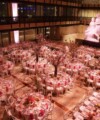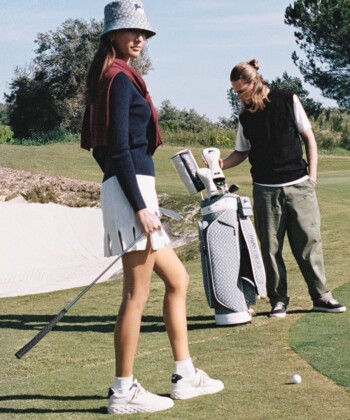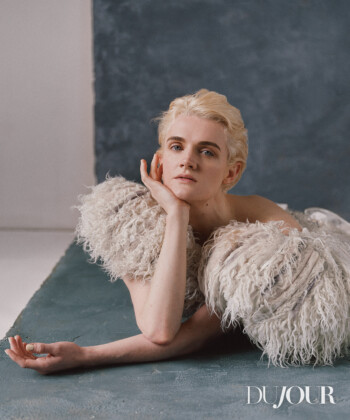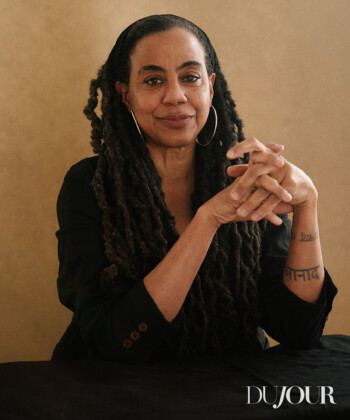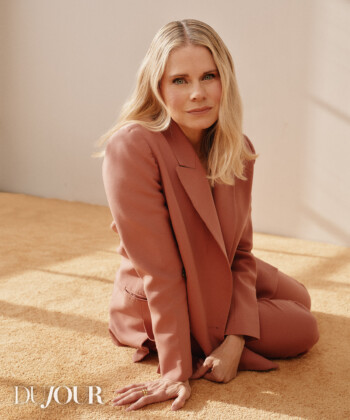Hilary Swank, her dog Kai at her feet, is having lunch at an outside table at Barbuto, a carefully casual Italian restaurant on Washington Street in New York City’s West Village. It’s a risky seating choice for an actress who generally keeps a low profile, but Swank has a pair of new movies to promote—You’re Not You and The Homesman—even if she doesn’t intend to allot a great deal of time to this interview.
“Thirty minutes,” Swank tells me as I sit down. “Because you know this isn’t a cover.”
In other words, the focus and commitment that the double-Oscar-winning actress brings to her work also comes into play in her media relations. Nevertheless, we end up talking for an hour. Part of the reason could be she’s waiting for her car, which is late. And part of it could be that she is enjoying her lunch of mussels, striped sea bass with farro and sautéed greens. But I’d like to think the chief reason is our absorbing conversation, which ranges from her determination to take subways and otherwise live a regular life (“I don’t understand how you can play people if you lose touch with people”) to her passion for acting. “I treat every performance as if it’s my last one,” she says. “I don’t want to leave anything on the table.”
Some of what the 40-year-old says about her career, it’s true, she’s said many, many times before. But even if this is take 50 for lines like, “I love people. I love people. I love how we all have our own unique stories,” she utters the words as though for the first time. Depending on your point of view, this is an actress who has a script and is sticking to it or someone who shows remarkable forbearance to the questions about her trailer park upbringing and her meteoric rise to fame in the late 1990s.
If you’re looking for a short answer, ask Swank about her private life.
Me: “Are you seeing anyone?”
Swank [pause]: “There is someone in my life. There is someone I’ve been dating for a couple of years now.”
Me: “He’s the Frenchman I read about?”
Swank [grudgingly]: “He’s French.”
Me: “Laurent Fleury?”
Swank [more grudgingly]: “That’s his name.”
Me: “Do you see yourself getting married again?”
Swank [even more grudgingly]: “Hopefully, someday, yeah.”
The controversies in Swank’s life—how she was paid to attend a 2011 birthday party for Chechnya’s dictator, Ramzan Kadyrov, and later apologized for it, after which she parted ways with her PR team—are even less welcome than the boyfriend queries. If you want a full and animated answer, ask Swank about baking. She holds up her arm, pointing to a “war wound” earned in the service of a peach-blueberry pie, reveals her secret for creating lemon curd and boasts happily, “I’ve learned to make a tarte au citron, which I have to say I’ve perfected.”
Swank does turn serious, and eloquent, when describing the character she plays, a strong-willed pioneer, in her latest film, The Homesman. The film co-stars Tommy Lee Jones, who also directed the offbeat western. It’s a role that suits her well, she believes, and not just because the movie is set in her native Nebraska.
“I’ve had instilled in me good morals, good values and good manners, and to me that’s the character I’m playing,” Swank says. “This is a woman who does the right thing not because she wants applause or for someone to like her more; she just does it because it’s right. I feel that, and feel we need more of that.”
What Swank herself had to deal with—the childhood poverty and slammed doors—has become a source of inspiration to others. “That’s incredible to me,” she says. “I see how people think they can’t achieve something because of their economic situation. It’s just not the case. You can look at any circumstance and make it what you want it to be, even if you’re talking about this other movie I just did.” She’s referring to You’re Not You, the recent release she produced and stars in as a musician stricken with ALS. “All these patients I talked to, the silver lining for a lot of them was, ‘Having a terminal illness is making me live the last few years of my life knowing I have this expiration date right in front of me,’ ” she says. “Those people were an inspiration to me. They’re dealing with a grave situation, but they’re looking at it with an attitude that makes you think, ‘Yeah, let’s put things into perspective.’ ”
A tour guide who has left his bus behind approaches the table. “Everybody loves you,” he says, pointing at the excited passengers on the top of the double-decker. “Would you wave to them?”
She lifts her hand in a brief salute and smiles gamely as iPhone cameras click. “I’ve probably got food in my teeth,” she says ruefully, as she stands up and prepares to leave.
The next night, I come home to a voicemail message from Swank. When I call back, she says she is concerned about something she said about ALS and wants to clarify it. “I wasn’t suggesting that people ignore their situation,” she says. “Being an optimist doesn’t mean you can’t be aware of the reality, but my point is never to give up.”
Swank continues: “I sometimes read magazine articles about me to see if something comes across the way I meant it to come across. If not, I can re-form it the next time. That’s the artist in me.”
I reassure her. And then I request her recipe for lemon curd.
“Maybe,” she says. “First let’s see how the story turns out.”


